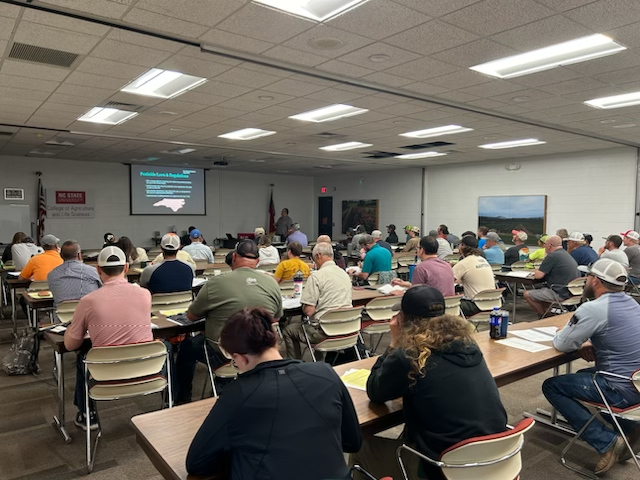Changing Environmental Pressures- Buncombe Extension Offering More Applied Pesticide Safety Trainings
go.ncsu.edu/readext?1000212
en Español / em Português
El inglés es el idioma de control de esta página. En la medida en que haya algún conflicto entre la traducción al inglés y la traducción, el inglés prevalece.
Al hacer clic en el enlace de traducción se activa un servicio de traducción gratuito para convertir la página al español. Al igual que con cualquier traducción por Internet, la conversión no es sensible al contexto y puede que no traduzca el texto en su significado original. NC State Extension no garantiza la exactitud del texto traducido. Por favor, tenga en cuenta que algunas aplicaciones y/o servicios pueden no funcionar como se espera cuando se traducen.
Português
Inglês é o idioma de controle desta página. Na medida que haja algum conflito entre o texto original em Inglês e a tradução, o Inglês prevalece.
Ao clicar no link de tradução, um serviço gratuito de tradução será ativado para converter a página para o Português. Como em qualquer tradução pela internet, a conversão não é sensivel ao contexto e pode não ocorrer a tradução para o significado orginal. O serviço de Extensão da Carolina do Norte (NC State Extension) não garante a exatidão do texto traduzido. Por favor, observe que algumas funções ou serviços podem não funcionar como esperado após a tradução.
English
English is the controlling language of this page. To the extent there is any conflict between the English text and the translation, English controls.
Clicking on the translation link activates a free translation service to convert the page to Spanish. As with any Internet translation, the conversion is not context-sensitive and may not translate the text to its original meaning. NC State Extension does not guarantee the accuracy of the translated text. Please note that some applications and/or services may not function as expected when translated.
Collapse ▲In 2023, Buncombe County green industry growers and producers approached Luke Owen, Buncombe County Commercial Horticulture Extension Agent, about providing more applied pesticide safety trainings in light of changing environmental pressures from shifting weather patterns, increasing urbanization, and pests/disease pressures shifting from invasive species populations. With over 500 pesticide applicators (both private and commercial), it is imperative that Extension Agents provide relevant and up-to-date information on invasive pests, diseases, and impacts of climate change and volatile weather patterns as it pertains to pesticide safety, plant selection, and other best management practices.
In response to this demand, a series of two pesticide safety topics were created to address environmental change in the context of plant selection and disease/pest management practices. A presentation entitled “Modern Cultivar Development and Impacts on Diseases/Pests in the Landscape” was created which talked about the impacts in applied plant breeding, what goes into a modern released cultivar, and discussed specific instances of how plant breeding has led to more rigorous and sustainable plants requiring less inputs (less pesticide, fertilizers, irrigation needed) which in turn leads to higher quality plants in the landscape.
A second presentation entitled “There’s a Bad Moon on the Rise: Emerging Pests/Diseases in WNC” was created to discuss the 10 most concerning pests in the WNC region as it relates to landscape pests. This presentation provides awareness of selected pests and diseases that might have been introduced to the area within the last 10 years.
The end result of offering these presentations to local growers was almost 100% of pest safety participants (22 horticulturists that participated in lecture series) stating that the topics were more relevant to their needs and that they could apply what they learned in plant management and future purchases. This shows the significance and importance of updating course material to highlight new and emerging threats to green industry professionals so that they have the tools they need to be successful in the future. Better management practices that will be adopted as a result of this series include purchasing cultivars with increased resistance/tolerance to pests/diseases, as well as identifying alternative plant sources that are more hardy in the ever volatile weather experienced in the region. Concurrently, 4 hours of pesticide credits were also given as a result of this training fulfilling many of their recertification requirements for their respective pesticide license categories.





